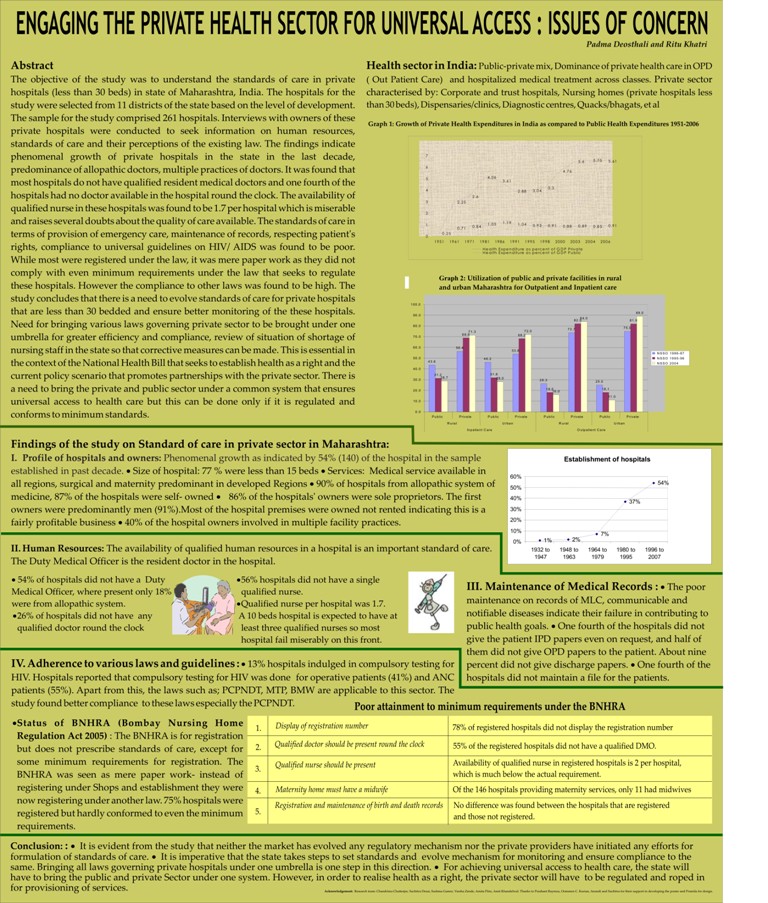CEHAT is running a 24*7 helpline to respond to women and girls facing violence .Please call this number 9029073154 for support and assistance.

Author(s): Padma Deosthali, Ritu Khatri
|Published Year: 2010
 Abstract: The objective was to understand the quality of care in private health sector in India. The is based on interviews with owners of private hospitals on human resources, standards of care and their perceptions of the existing law. The sample was drawn from 11 districts of the state based on level of development with 261 hospitals selected. The findings indicate phenomenal growth of private hospitals in the state, predominance of allopathic doctors, multiple practices of doctors, lack of qualified resident medical doctors. The ratio of qualified nurses was 1:1.6 in these hospitals which is miserable and raises several doubts about the quality of care available. The standards of care in terms of provision of emergency care, maintenance of records, respecting patient’s rights, compliance to universal guidelines on HIV/ AIDS was found to be poor. While most were registered under the law, it was mere paper work as they did not comply to even minimum requirements under the law that seeks to regulate these hospitals. However the compliance to other laws was found to be high. The study concludes that there is a need to evolve standards of care for private hospitals that are less than 30 bedded and ensure better monitoring of the these hospitals. Need for bringing various laws governing private sector to be brought under one umbrella for greater efficiency and compliance, review of situation of shortage of nursing staff in the state so that corrective measures can be made. This is essential in the context of the National health Bill that seeks to establish health as a right. This would require that the private sector be brought under a common system that ensures universal access to health care but this can be done only if it is regulated and conforms to minimum standards.
Abstract: The objective was to understand the quality of care in private health sector in India. The is based on interviews with owners of private hospitals on human resources, standards of care and their perceptions of the existing law. The sample was drawn from 11 districts of the state based on level of development with 261 hospitals selected. The findings indicate phenomenal growth of private hospitals in the state, predominance of allopathic doctors, multiple practices of doctors, lack of qualified resident medical doctors. The ratio of qualified nurses was 1:1.6 in these hospitals which is miserable and raises several doubts about the quality of care available. The standards of care in terms of provision of emergency care, maintenance of records, respecting patient’s rights, compliance to universal guidelines on HIV/ AIDS was found to be poor. While most were registered under the law, it was mere paper work as they did not comply to even minimum requirements under the law that seeks to regulate these hospitals. However the compliance to other laws was found to be high. The study concludes that there is a need to evolve standards of care for private hospitals that are less than 30 bedded and ensure better monitoring of the these hospitals. Need for bringing various laws governing private sector to be brought under one umbrella for greater efficiency and compliance, review of situation of shortage of nursing staff in the state so that corrective measures can be made. This is essential in the context of the National health Bill that seeks to establish health as a right. This would require that the private sector be brought under a common system that ensures universal access to health care but this can be done only if it is regulated and conforms to minimum standards.

CEHAT is running a 24*7 helpline to respond to women and girls facing violence .Please call this number 9029073154 for support and assistance.